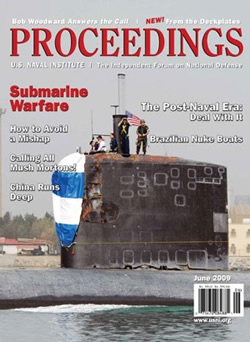 |
|
An article in USNI, which carries this photo of USS Hartford (SSN-768) damaged in a recent collision, discusses China’s ballistic missile submarines. |
By Hans M. Kristensen
The magazine U.S. Naval Institute Proceedings has an interesting article about China’s nuclear ballistic missile submarines written by Andrew S. Erickson and Michael Chase from the U.S. Naval War College. And I’m not just saying that because they reference several of my publications about China, but because they provide an interesting discussion of the possible motivations for China’s emerging sea-based nuclear force.
I, for one, have always wondered why, if China’s current strategic modernization is intended to reduce the vulnerability of its long-range nuclear deterrent, would China want to cluster a significant portion of its missiles on a few submarines and send then out to sea where U.S. attack submarines can hunt them down?
In theory a sea-based nuclear deterrent is invulnerable because it can hide. But given that the U.S. Navy’s Maritime Strategy in the 1980s was explicitly designed to find and sink Soviet ballistic missile submarines before they could launch their missiles, how secure will China’s sea-based nuclear deterrent actually be? Or how would China react in a crisis, if one of the submarines went missing due to an accident?
.
The last remaining agreement limiting U.S. and Russian nuclear weapons has now expired. For the first time since 1972, there is no treaty-bound cap on strategic nuclear weapons.
The Pentagon’s new report provides additional context and useful perspectives on events in China that took place over the past year.
Successful NC3 modernization must do more than update hardware and software: it must integrate emerging technologies in ways that enhance resilience, ensure meaningful human control, and preserve strategic stability.
The FY2026 National Defense Authorization Act (NDAA) paints a picture of a Congress that is working to both protect and accelerate nuclear modernization programs while simultaneously lacking trust in the Pentagon and the Department of Energy to execute them.